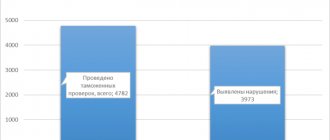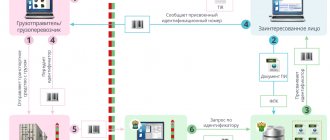6K 1 2 min.
The creation of a unified information base for the tax and customs services removes from the agenda the previously discussed issue of the physical unification of the two departments, follows from the statement of First Deputy Prime Minister Anton Siluanov at the joint board of the Federal Tax Service and the Federal Customs Service on Thursday. The exchange of data on customs declarations, exported goods, debts on customs duties and violations of tax laws allowed the services to create a complete dossier on entrepreneurs, dividing them into categories depending on the degree of conscientiousness.
Photo: Dmitry Dukhanin, Kommersant / buy photo
A further increase in the collection of budget revenues should occur through a unified mechanism for administering tax and customs payments, First Deputy Prime Minister and Minister of Finance of the Russian Federation Anton Siluanov said on Thursday at a joint board of the Federal Tax Service and the Federal Customs Service. The government expects that the exchange of data on taxpayers and participants in foreign trade activities will allow the state to save resources and increase the precision of inspections. According to the First Deputy Prime Minister, the creation of a unified system actually eliminates the need for an organizational unification of the two structures - this possibility, we recall, was previously discussed by the previous government.
At a board meeting held in the Moscow Manege, the head of the Federal Tax Service, Mikhail Mishustin, announced an increase in revenues to the consolidated budget over eight months by 21.5%, to 13.6 trillion rubles. They noted that a quarter of a trillion rubles was ensured by improved administration, including the use of FCS information. Income tax revenues increased by 20% compared to the same period last year (up to 2.7 trillion rubles), for personal income tax - by 12.5% (up to 2.3 trillion rubles), for VAT - by 15% (up to 2.2 trillion rubles). The number of on-site inspections decreased by 29%; based on their results, an additional 191 billion rubles were accrued, including 45 billion rubles in cooperation with the Federal Customs Service.
Functions of the Federal Customs Service and the Federal Tax Service
The Federal Customs Service (FCS) exercises supervision and control in the field of customs affairs. This body is designed to perform several functions:
- carrying out customs control;
- collection of duties and taxes;
- maintaining statistics in the field of foreign economic activity;
- protection of intellectual property rights;
- ensuring the order of movement of goods across the border;
- detection and suppression of offenses;
- currency control.
The Federal Tax Service (FSN) exercises economic control in Russia. The FSN has the following responsibilities:
- control and supervision of compliance with legislation in the field of taxes and fees;
- control over tax payments;
- control of the use of cash register equipment;
- currency control;
- registration of legal entities and individuals, individual entrepreneurs and self-employed people.
This is just a basic list of the functions of these departments. In fact, their powers are much broader.
Interaction between tax and customs authorities
Suppression of tax crimes during tax control activities Read more: Interaction of tax authorities with other executive bodies
2.3 Interaction between tax and customs authorities
In order to organize interaction between the tax and customs authorities of the Russian Federation in order to fulfill the tasks assigned to them, the heads of the tax authorities of the Russian Federation and the heads of the customs authorities of the Russian Federation in the center and locally take measures to organize and implement interaction in the following main areas:
1. Exchange of information on issues of mutual interest.
For these purposes, these bodies organize the interaction of information systems and provide each other free of charge, upon appropriate requests, information contained in archives, records and data banks; inform about facts of violation of tax and customs legislation; about individuals and legal entities related to such violations; reasons and conditions conducive to the commission of tax and customs offenses.
2. The transfer of information on customs declarations from the State Customs Committee of the Russian Federation to the Ministry of Taxes of the Russian Federation, as well as the exchange of other necessary information and information is carried out on magnetic media or through communication channels between the Main Scientific Research Computing Center (GNIVC) of the Ministry of Taxes of the Russian Federation and the Main Scientific Information Center (GNITC) of the State Customs Committee of the Russian Federation[30 ].
Information transmitted from the State Customs Committee of the Russian Federation to the Ministry of Taxes of the Russian Federation includes information from customs declarations for all participants in foreign economic activity and groups of the Commodity Nomenclature of Foreign Economic Activity.
Customs authorities inform tax authorities about participants in foreign economic relations (legal and postal addresses, financial details, telephones, faxes, telexes); provide information on the declaration of goods and vehicles transported across the state border (cargo customs declarations, transport declarations, information about declarants).
Tax authorities, on their own initiative or at the request of customs authorities, issue information about the available information necessary for customs control.
When tax and customs authorities interact, the latter inform the tax authorities within 24 hours in the prescribed form about identified violations so that the tax authorities can make a decision in accordance with the current legislation of the Russian Federation. And the tax authorities - about the measures they have taken to address the violations identified by the customs authorities, indicating the measures of responsibility for these violations. Tax authorities ensure the formation of a Consolidated State Register of licenses for the purchase, storage and export of alcoholic products, for the import, storage and supply of alcohol and alcohol-containing products.
In accordance with paragraph 3 of Art. 82 of the Tax Code of the Russian Federation, tax authorities, customs authorities and internal affairs authorities, in the manner determined by agreement between them, inform each other about the materials they have on violations of the legislation on taxes and fees and tax crimes, about the measures taken to suppress them, about the measures they are carrying out tax audits, and also exchange other necessary information in order to perform the tasks assigned to them.
The need for interaction between internal affairs bodies and tax and customs authorities is due to a number of reasons. Taxpayers do not submit tax reports to the tax authorities in 40% of cases. The fight against tax offenses makes it possible to reveal the financial base where crime and corruption arise and operate. The solution to this problem depends on the successful interaction of internal affairs bodies, customs and tax authorities. Among the methods of such interaction developed in practice are: exchange of operational information about violations of the legislation on taxes and fees, assistance to tax authorities in seizing documentation, conducting joint inspections to ensure the safety of money and material assets at the objects being inspected[31].
The interaction of tax and customs authorities with internal affairs bodies is aimed at improving the mechanism for implementing provisions governing relations in the field of foreign trade. It can include various forms, consisting of joint rule-making activities. According to experts, the most important form of interaction between public authorities is the publication of joint legal acts.
The most common form of interaction between customs authorities and other executive authorities is the exchange of information upon written requests. Statistical information and clarifications of legislation are requested, the positions of these bodies on issues under their jurisdiction are clarified and agreed upon. Considering that one of the functions of customs authorities is to ensure the permitting procedure for the movement of goods across the customs border, licenses and other permits issued by the Ministry of Economic Development of Russia, the Ministry of Defense of Russia, Rostekhnadzor of Russia and other government bodies are subject to verification.
Interaction and coordination of the activities of internal affairs bodies with tax and customs authorities should be carried out in the following forms:
— adoption of joint normative legal acts on issues within their jurisdiction;
— implementation of a mechanism for carrying out individual legal procedures, planning and conducting joint events aimed at solving problems of interaction between the parties;
— methodological interaction on issues falling under joint jurisdiction and the main areas of interaction between the parties;
— coordination of efforts to identify, suppress and prevent violations of legislation on taxes and fees, customs affairs, currency regulation and currency control;
— information interaction, provision of information on issues of interest to the parties, taking into account the principle of confidentiality;
— exchange of experience in order to increase the professionalism of personnel and improve legal procedures;
— conducting joint examinations and consultations;
— creation of joint working groups, conducting research on issues within the jurisdiction of the parties;
— holding scientific and practical seminars, including with participants in foreign economic activity, aimed at achieving the goal of promoting the development of foreign trade[32].
Suppression of tax crimes during tax control activities Read more: Interaction of tax authorities with other executive bodies
Information about the work “Identification and suppression of tax crimes during tax control activities”
Section: Financial sciences Number of characters with spaces: 81055 Number of tables: 6 Number of images: 0
Similar works
The main activities of the Federal Tax Police Service in identifying and suppressing financial crimes
224216
2
4
… . The criminal legal fight against tax crime is one of the main directions of ensuring law and order in the field of taxation. Chapter 3. MAIN AREAS OF ACTIVITY OF THE FEDERAL TAX POLICE SERVICE TO IDENTIFY AND SUPPRESS FINANCIAL CRIMES At the board of the Federal Tax Service of the Russian Federation in January 20001 in Moscow, held with the participation of the President of the Russian Federation V.V. Putin, the results were summed up...
Functions of an investigator in the investigation of tax crimes
296463
0
0
...), of interest to the internal affairs bodies, and necessary for them to fulfill their assigned tasks. In this case, it is necessary to take into account the operational specifics of the work of law enforcement agencies. In modern conditions, information about the economic activities of the taxpayer, reflected in the accounting documentation, becomes important for identifying, suppressing and investigating tax crimes...
Tax crimes
160998
0
0
... 2007. – 398 p. 43. Kucherov I.I. Crimes in the field of taxation: scientific and practical commentary on the Criminal Code of the Russian Federation. M., YurInfoR. 2008. – 438 p. 44. Kucherov I.I., Solovyov I.N. Criminal liability for tax crimes. M., JSC "...
Activities of the tax police in the fight against tax offenses (based on materials from the Federal Bailiff Service of the Russian Federation)
79553
1
0
... the provisions of parts four, five and six of Article 6 of the Law “On the Federal Tax Police Bodies” bear disciplinary, administrative and criminal liability in accordance with the law. Chapter II. FORMS AND METHODS OF COMBATING TAX OFFENSE An offense is an act that violates the requirements established by the legal norms of the relevant industry...
Why is integration of the Federal Customs Service and the Federal Tax Service necessary?
The main argument in favor of merging the Federal Customs Service and the Federal Tax Service is the positive world practice of functioning as a single body. For example, in European countries, the tax service takes over all the fiscal functions of customs. In Russia, despite the fact that both departments are subordinate to the Ministry of Finance, in fact they are two different organizations. Of course, they interact with each other on different levels. However, this method does not allow us to talk about complete integration. Another barrier arises that affects work efficiency.
The main limiting factor remains the unavailability of the Unified Information System for the Federal Customs Service and the Federal Tax Service. Such a practice would make it possible to track the chain of passage of cargo from crossing the border to final sale on the market, as well as to monitor the persons responsible for the goods. Thus, gray and black schemes could no longer exist. Which in turn has significantly reduced the share of smuggling on the market.
The first steps in this direction were made in the field of alcoholic beverages. The Federal Service for Regulation of the Alcohol Market created the Anti-Counterfeit Alco mobile application. With it, you can scan a tax stamp or QR code of a product and find out basic information about the product. And also, check the availability of a license to sell alcoholic beverages. To make this possible, EGAIS was created - the Unified State Automated Information System for recording the volume of production and turnover of ethyl alcohol, alcoholic and alcohol-containing products.
History of the issue and problems associated with the merger
In fact, conversations about merging the Federal Customs Service and the Federal Tax Service have been going on for a long time, since 2015. Official sources spoke about the final merger of departments in 2021 and 2021. Other dates were repeatedly mentioned, but a final decision on this issue was never made.
Partial integration of the customs and tax systems is already underway. Now departments are exchanging information from their databases. The Federal Tax Service has access to data on customs declarations, and the Federal Customs Service has access to the tax files of participants in foreign trade activities. However, this is still far from creating a single fiscal authority.
The merger of the Federal Tax Service and the Federal Customs Service will cost the state a lot of money. This is also cited as an argument in favor of maintaining the status quo of organizations. But it should be understood that further benefits and the elimination of gray and black business schemes will help offset the costs incurred. One way or another, strategically this is the right decision.
The Federal Customs Service and the Federal Tax Service are the largest administrators of state budget revenues. Their total share in its formation is about 80% of all income. Their combination will reduce administrative costs in the financial sector. But there is also a downside. Establishing competent work of an agency with such a large field of activity can be an overwhelming task. Integration is also hampered by bureaucratic factors.
How the CSR proposed to reform the collection of duties
Anton Siluanov on Thursday spoke about expanding the use of the tax free regime (it is now in effect in 12 regions), saying that its introduction made it possible to increase trade turnover in participating retail outlets by 25%. According to him, the system showed itself especially well during the 2018 World Cup in Russia. “We will continue to expand it, solve integration problems so that the tax free system works without failures,” added the First Deputy Prime Minister. He also recalled the experiment of Russian Post and the Federal Customs Service, starting on November 1 of this year, to provide citizens with the opportunity to pay duties for purchases above the duty-free threshold right when ordering goods - let us remind you that from 2021 the duty-free import rate for foreign online purchases will be reduced to €500 per month.
Tatiana Edovina





